A solid SEO strategy is non-negotiable for scaling a law firm’s digital presence. But with so much competition and so many big-budget players, navigating SEO can feel overwhelming. How can you compete?
Keyword research tools provide law firms with insights to understand their website, competitors, and, most importantly, searchers (i.e., your potential clients). They each reveal important data about what users are searching for in your market so you can create legal content that satisfies their search intent and captures new leads.
But here’s where it gets tricky.
You’re not sure which is the best tool for keyword research. Whatever tool you choose should provide the insights necessary to develop a custom digital strategy for your law firm. Without the right tool, you risk making uninformed decisions—leaving your strategy to chance.
Let’s explore the key features to look for in keyword tools and break down how to use them to craft effective SEO and legal content strategies. We’ll share how we leverage tools like Semrush and Ahrefs to understand our clients’ markets and build winning strategies that increase traffic, leads, and, most importantly, signed cases.
What are the benefits of keyword search tools?
Keyword search tools are powerful resources…when used correctly. Otherwise, they’re mostly meaningless.
But when you know what to look for and how to look for it, keyword research tools can help grow your firm, attract prospective clients, and help you outrank your competitors.
Let me explain.
First, here’s what everybody knows: When someone needs legal help, you have a small window of opportunity to reach them. If your page isn’t on page one of the organic search engine’s results, potential clients may never know you exist. But if you rank in one of the top 3 spots of the organic results on page one, you’ll get more clicks and more cases for your firm.
But rank higher for what? We use keyword research tools to:
- Identify the words and phrases people are typing into search engines.
- Understand which queries drive business to you and your competitors.
- Target keywords your competitors aren’t targeting.
- Reach people seeking your services.
That last point – reach people seeking your services – is crucial.
So many SEO strategies prioritize search volume and traffic over identifying the keywords that drive qualified leads. We see it time and time again—websites get decent traffic and rank for some high-volume keywords, but fail to make the phone ring. What gives?
Only carefully selected keywords attract qualified leads. If you don’t choose the keywords you’re targeting wisely, you’ll waste a lot of time and energy with little reward.
Unlocking the full potential of these tools is not just about knowing why they’re valuable but also understanding what makes one tool better suited for your goals than another. Let’s dive into the essential features to look for in a keyword search tool and how to choose one that aligns with your needs.
What should I look for in a keyword search tool?
When choosing a keyword search tool, it’s essential to look for features that align with your goals and provide actionable insights for your SEO or marketing strategy. A good tool should help you uncover valuable keywords, understand the competition, and prioritize efforts based on data-driven metrics.
Find a tool that includes at least these features:
- Keyword volume
- Related keywords
- Keyword difficulty
- Competitor analysis
- User intent
- Customizable reporting
- Pricing
- Keyword tracking/monitoring
Keyword volume
Keyword volume is a critical metric that any of the tools used for keyword research should provide, as it helps you understand how many people are searching for a specific term within a given timeframe. This data allows you to gauge the potential impact of targeting that keyword in your content or advertising campaigns.
High search volume keywords indicate broad interest or demand, making them ideal for driving traffic. Conversely, low-volume keywords may represent niche opportunities where competition is lower but the intent is highly specific.
Here is a screenshot from AHrefs:

Looking in AHrefs, which uses its own algorithm for data, we see that their volume column estimates the number of searches that include that keyword. This can be useful for understanding the search volume for a certain keyword.
By understanding search volume, you can prioritize which keywords to target, balancing traffic potential with competition, and aligning your strategy with your goals. A tool that gives clear, accurate keyword volume insights empowers you to make data-driven decisions, ensuring your SEO and marketing efforts deliver maximum ROI.
Related keywords
Related keywords are crucial because they help you identify topics that can guide your content strategy.
Some related keywords may suggest distinct topics worthy of their own dedicated pages, allowing you to dive deeper into specific aspects of your offerings and attract highly targeted traffic. Others might indicate variations or subtopics that fit well within a single page, helping you create comprehensive, in-depth content that meets user expectations.
By leveraging related keywords, you can strategically decide which ideas deserve standalone content and which should be combined, optimizing your site for both user engagement and search engine visibility.
AHrefs, Semrush, and many other tools include related keyword features.
The keyword research tool AnswerThePublic.com offers a unique approach to related keywords by visualizing them as questions, prepositions, and comparisons, helping you uncover a wide range of user queries and content ideas that align closely with search intent.
If you want to write a law firm marketing blog about divorce, enter the word ‘divorce’ to find associated keywords.
You’ll see this data pop up:

These results show the top questions people are searching for around divorce. The darker the green circle next to a question, the more searches that question is getting.
They make for great FAQs for your blog and inspiration for topics. But they don’t work well for primary keywords.
If you scroll down, you’ll see keywords organized alphabetically.
Like this:
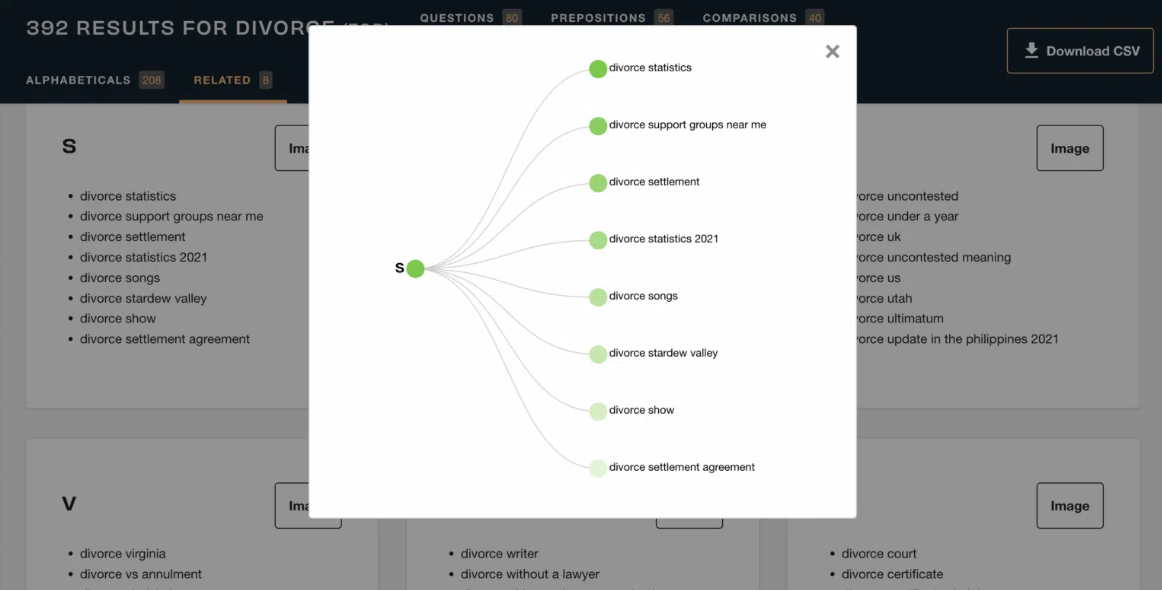
These results offer shorter, specific keywords you can use as the focal point for your content.
The same rule applies to the shades of green shown here. More people search for ‘divorce statistics’ than ‘divorce settlement agreement.’
You may think using the keyword ‘divorce statistics’ will make your blog appear in more people’s results.
But SEO is more nuanced.
If more people search for ‘divorce statistics,’ you’ll have more competition. Your content may get lost among a bunch of other blogs.
Keyword difficulty
Keyword difficulty helps you evaluate how challenging it will be to rank for a particular term in search engine results.
By understanding keyword difficulty, you can prioritize efforts on terms where your chances of ranking are higher, balancing competition with potential traffic. This is especially valuable for smaller businesses or new websites that may struggle to compete with established players on highly competitive keywords.
Additionally, keyword difficulty helps you allocate resources effectively, focusing on keywords where your time and effort are most likely to yield results. A tool that provides keyword difficulty insights ensures your SEO strategy is both realistic and data-driven, improving the likelihood of achieving your goals.
We searched ‘divorce statistics’ in Semrush and saw this:
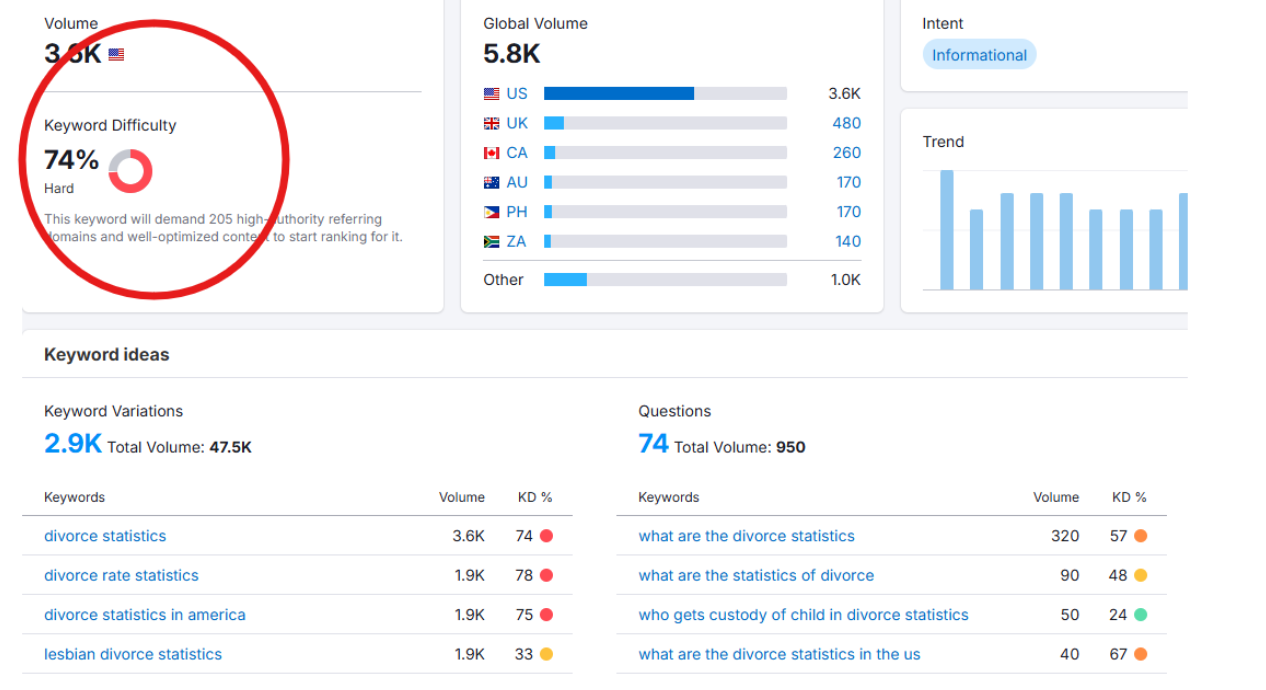
Semrush tells us this keyword is “the hardest keyword to compete for.”
Nothing is impossible, but you want to give your content the best chance of getting clicks. Using a keyword this difficult to rank for isn’t giving your content much opportunity to show up on SERPs. And it’s definitely not working smarter.
So next, we searched ‘divorce settlement agreement.’ We got this result:
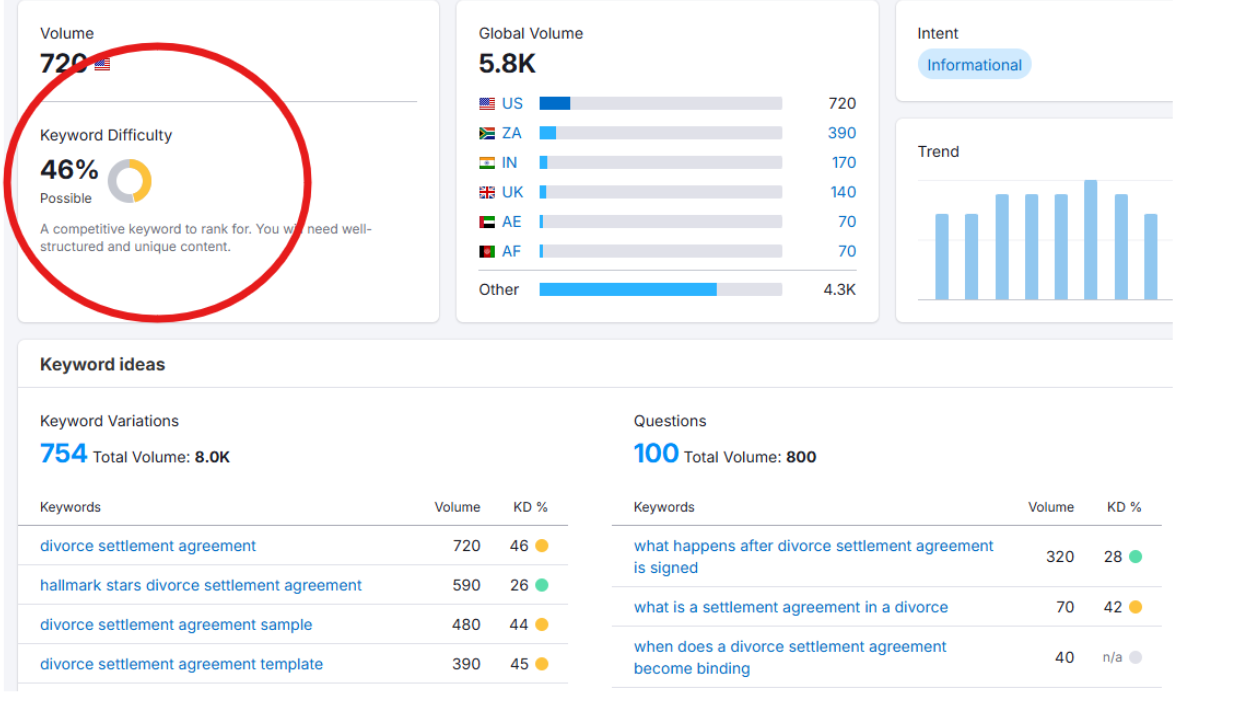
While Semrush says using this keyword is still “difficult,” your content would be up against a 46% difficulty rating instead of a 74% rating. That’s working smarter instead of harder.
Doing this research means catching more people when they start looking for help – before they find your competitors.
Competitor analysis
Competitor analysis features allow you to uncover the strategies your rivals are using to rank in search engines. Competitor keyword research analyzes the keywords your competitors target, the content they produce, and their backlink profiles, you can identify gaps in their strategy and opportunities to outperform them.
These features provide insights into high-performing keywords you might have overlooked and help you understand what’s working in your industry. With this information, you can refine your approach, differentiate your content, and position your brand more effectively in the competitive landscape.
Here’s an example from Semrush:
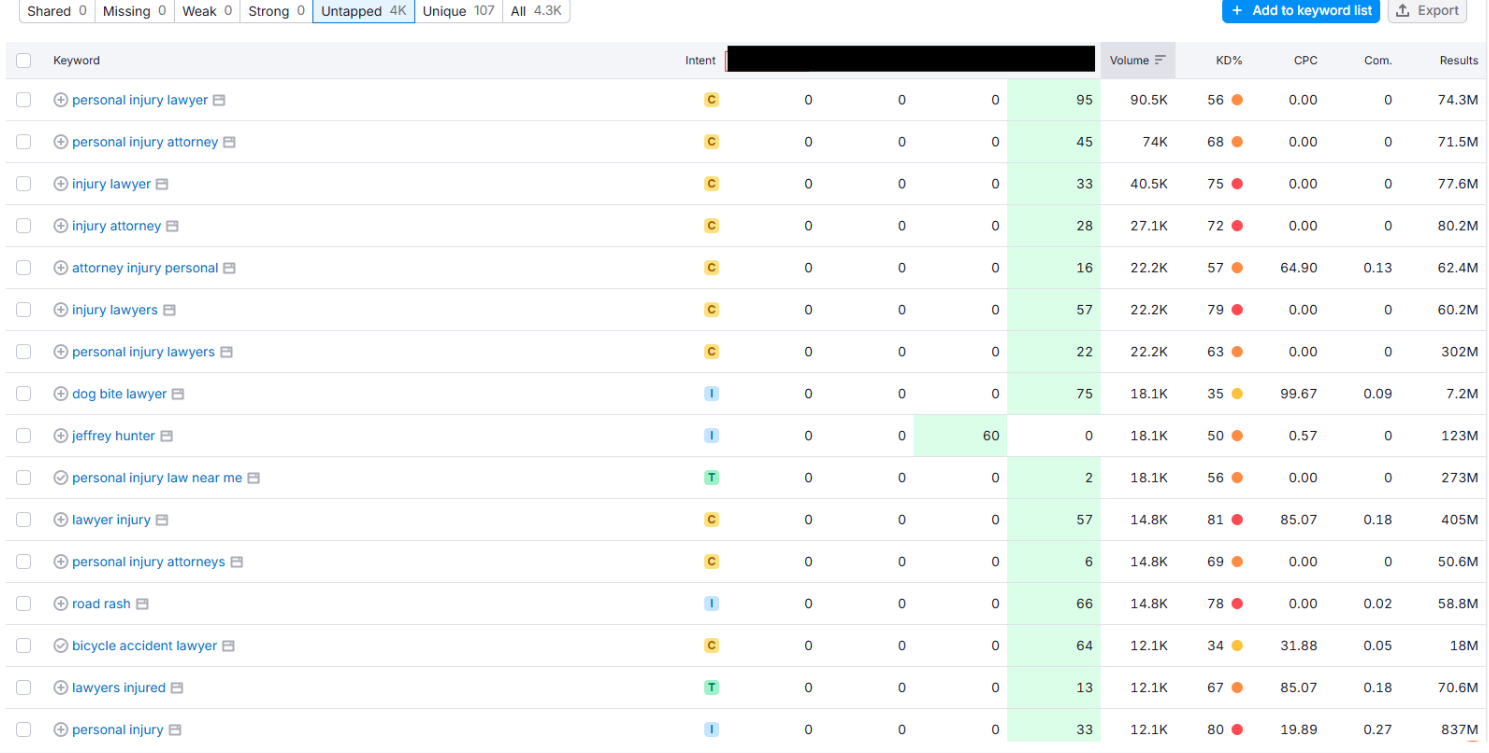
And one from AHrefs:
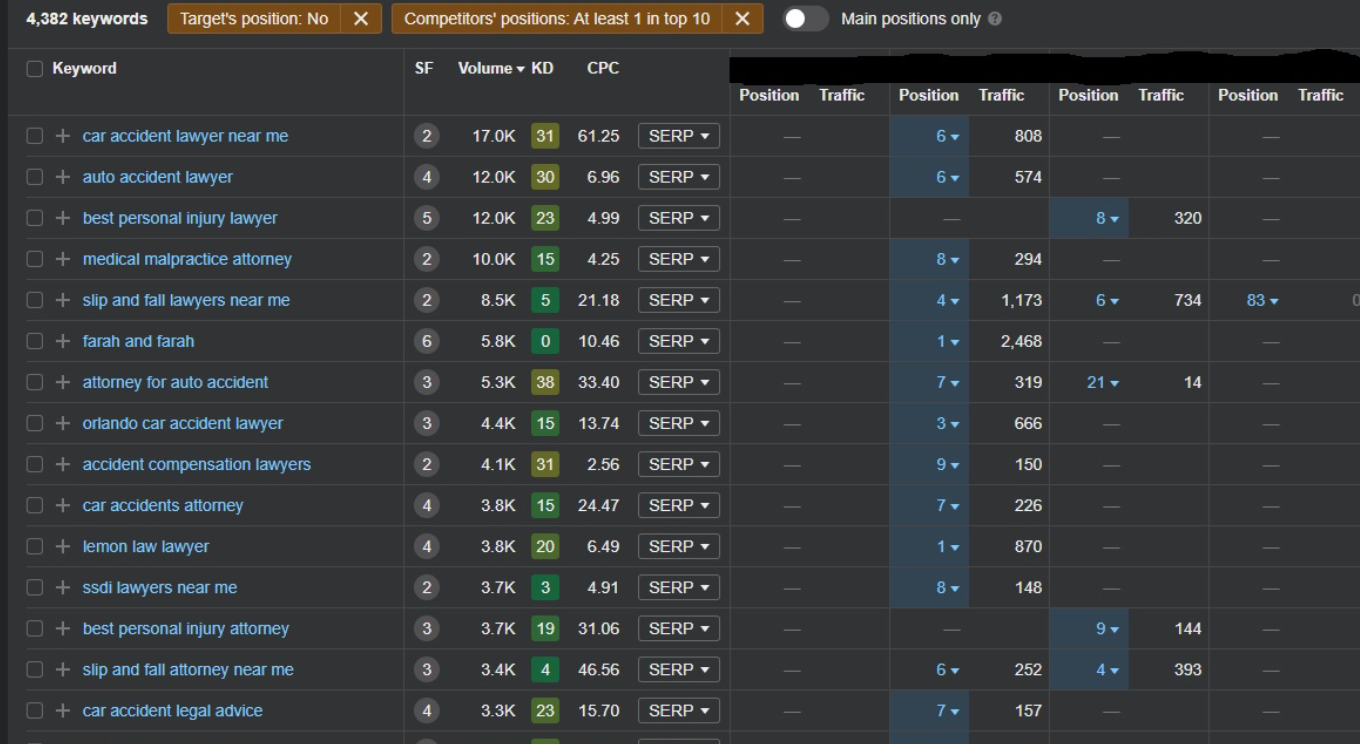
Competitor data like this shows you the keywords and topics driving traffic to similar businesses in your niche. Incorporating these keywords into your content strategy helps you tap into proven traffic-driving queries. The challenge, then, is creating more comprehensive, authoritative content. The first step in that process is understanding the searcher’s goal.
User intent
Understanding user intent is critical because it helps you align your content with what searchers are truly looking for.
When you analyze user intent carefully, you can categorize keywords into buckets such as informational, navigational, transactional, or commercial. From there, you can create content that meets each bucket’s specific needs.
For instance, an informational query requires detailed explanations, while a transactional query signals a readiness to hire or purchase. By identifying the intent behind a keyword, you can ensure your content not only ranks well but also resonates with users and drives conversions.
- Informational Intent: Searchers are seeking knowledge or answers to specific questions, often looking for how-to guides, explanations, or definitions.
- Navigational Intent: Users want to find a particular website or brand, often entering terms like “Facebook login” or “Nike homepage.”
- Transactional Intent: Searchers are ready to take action, such as making a purchase or signing up for a service, and they often include terms like “buy” or “discount.”
- Commercial Intent: Users are researching products or services with the intent to buy soon, often using terms like “best,” “reviews,” or “compare.”
A keyword tool with user intent insights enables you to craft a more targeted and effective SEO strategy, delivering the right message at the right stage of the customer journey.
Here’s an example from Semrush:

But a word of caution. The tool doesn’t always get it right. Take this example.

Notice it calls a few keywords informational when we’d intuitively define them as commercial or transactional intent. Use keyword tools as just that, tools. Don’t let them overrule your instinct.
Customizable reporting
Customizable reporting features allow you to select the most relevant metrics, such as keyword rankings, traffic, or competitor performance, and present them in a format that aligns with your strategy.
Whether you’re focusing on granular details for internal teams or high-level summaries for stakeholders, customizable reports ensure the data is clear and actionable. These features also save time by enabling you to create templates or automate recurring reports, ensuring consistent updates without manual effort. With customizable reporting, you can deliver insights that matter most, empowering smarter decision-making and demonstrating the effectiveness of your SEO strategy.
Imagine your goal is to improve organic search visibility for a personal injury firm. Using customizable reporting features, you can highlight key metrics such as rankings for high-intent keywords like “personal injury lawyer” or organic traffic growth to practice area pages.
You can exclude unrelated metrics like paid ad performance, creating a clear, focused report that demonstrates how your organic SEO strategy is driving more potential clients to the website.
Pricing
Pricing is a crucial factor when choosing a keyword research tool. It needs to fit within your budget while still offering the features you require.
Tools vary widely in cost, from free keyword tools with basic functionality to premium keyword analysis platforms with advanced features like competitor analysis, user intent insights, and comprehensive reporting.
It’s essential to evaluate whether the pricing aligns with your goals and the scale of your campaigns. For small businesses or those just starting with SEO, budget-friendly tools like AnswerthePublic.com might suffice, while larger organizations may benefit from investing in robust platforms like AHrefs or Semrush.
By considering your budget alongside capabilities, you can ensure you’re getting the best value for your investment without overspending on unnecessary features.
So, what is the best keyword search tool?
That’s a loaded question. If you type into Google ‘keyword search tool,’ you’ll find many companies claiming to have the best tool.
Here is a quick summary of a few of the most popular keyword search tools.
Semrush is a comprehensive digital marketing platform offering tools for SEO, keyword research, competitor analysis, content marketing, and PPC campaigns. Known for its robust keyword database and insights into organic and paid search strategies, Semrush empowers users to optimize online visibility, track performance, and uncover new growth opportunities across multiple channels.
Ahrefs is a comprehensive SEO toolset offering features such as backlink analysis, keyword research, competitor insights, rank tracking, and site audits. By providing actionable data and analytics, it enables users to enhance search rankings and online visibility.
Moz Keyword Explorer is a powerful tool for discovering and analyzing keywords using metrics like search volume, difficulty, and organic CTR. It helps identify high-value keywords, align content with search intent, and provide SERP analysis to improve rankings. Free and premium options make it accessible for businesses of all sizes.
Google Search Console is a free tool that provides insights into how your website performs in Google Search. It helps track search traffic, identify ranking keywords, analyze click-through rates, and detect technical issues. Ideal for optimizing SEO, it offers actionable data to improve visibility and enhance your site’s performance.
AnswerThePublic is a keyword tool that visualizes questions, phrases, and comparisons people search for online. By analyzing autocomplete data from search engines, it reveals insights into user intent and content opportunities. Ideal for marketers and creators, it helps generate ideas and optimize content to effectively address audience needs.
BuzzSumo is a content research and performance tool that helps identify trending topics, analyze competitor content, and discover high-performing keywords. It provides insights into audience engagement by tracking shares, likes, and comments across platforms. Ideal for content marketers, BuzzSumo simplifies creating shareable content and refining strategies for maximum impact.
| Pricing | Keyword volume | Related keywords | Keyword difficulty | Competitor analysis | User intent | Customizable reporting | |
|
Semrush |
Paid |
✔ |
✔ | ✔ | ✔ | ✔ |
✔ |
|
Ahrefs |
Paid |
✔ |
✔ | ✔ | ✔ | ✔ | ✔ |
| Google Search Console | Free | ✖ | ✖ | ✖ | ✖ | ✔ |
✔ |
|
AnswerthePublic |
Paid |
✔ |
✔ | ✖ | ✖ | ✔ |
✔ |
| Moz Keyword Explorer |
Paid |
✔ |
✔ | ✔ | ✔ | ✔ |
✔ |
| BuzzSumo |
Paid |
✔ | ✔ | ✔ | ✔ | ✔ |
✔ |
Let us stress over your keywords and SEO.
If you’re a lawyer or work in the marketing department of a law firm, we’d love to talk.
We have the keyword search tools and experience to give your content an edge in the search results.
Call us at (954) 425-9081 or reach out to us here and let’s make a bigger impact.

Yvette Valencia is the Latina founder and CEO2 of We Do Web Content, a content marketing agency for law firms and one of Inc. 5000’s fastest-growing private businesses in America. She’s a 14-year content marketing veteran and Six Sigma-certified Green Belt credited with developing the proven (and repeatable) process for creating top-ranking website content at scale for attorneys.

